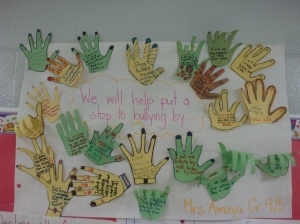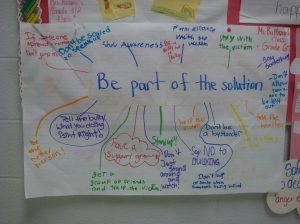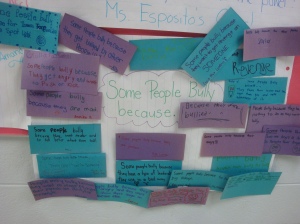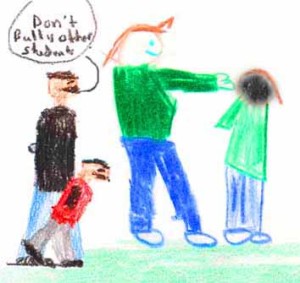 In order to understand how racism, stereotyping, and bigotry are related to bullying, it is necessary to understand the following concepts.
In order to understand how racism, stereotyping, and bigotry are related to bullying, it is necessary to understand the following concepts.
What is racism?
Answer: Racism is based on the belief that certain racial groups are of less value or inferior to others. Racism often focuses on physical appearance such as skin color and certain facial or body characteristics. People who believe that certain racial groups are inferior to others are called racists. Racists think it’s okay to treat members of certain races with less respect than others.
What are racial groups?
Answer: The idea that humans can be divided into specific groups called races. These groups are usually determined by skin colour, facial appearance, skills and character. Back in the 1800’s many people believed that humans could be divided into three races: White, black and yellow. Others believed there were up to thirty different races.
What does prejudice mean?
Answer: The word prejudice means to make up your mind about someone before considering the facts. It means to pre-judge. Being prejudiced usually involves a negative opinion or conclusion about a person or group of people without really knowing what that person or group of people is really like. A person who is prejudiced will probably continue their incorrect beliefs even when others point out the truth. People who are prejudiced believe they know what people are like based on the color of their skin.
What is stereotyping?
Answer: Stereotyping is when people have a set idea about what a group of people are like. An example might be a belief that all African American people are less intelligent than white people. Even if the characteristic appears to be a positive one, it is still inappropriate and insulting because it labels all people in a group rather than identifying people as individuals. An example of this might be a belief that all Asian people are excellent mathematicians.
What is a bigot?
A bigot is a prejudiced person who is intolerant of any opinions differing from their own or intolerant of people of different political views, ethnicity, race, class, religion, profession, sexuality or gender.
Archie Bunker was a bigoted character in a 1970’s television show called ‘All In The Family’. He had shocking

Archie Bunker from All In The Family
false beliefs that were based on his prejudiced thinking. It was a comedy in the form of satire. This means it makes fun of people and situations that at first might appear to be acceptable. The show actually pointed out to the viewer how ridiculous Archie’s beliefs actually were.
Bullying is often a result of racism, stereotyping, prejudice and bigotry.
Inappropriate comments, jokes and so-called humor can sometimes make unacceptable beliefs seem okay. Bigotry can also lead to discrimination where people of certain descriptions would not be able to get jobs or be allowed into specific organizations. This can also lead to violence. Some of the behaviours that come from bigotry fall into the category of bullying.
It is easy to realize that bullying is sometimes related to being prejudiced against a group of people.
In order to stop this kind of bullying it is necessary for parents, schools, students, and community to all work together to end it. By keeping open communication with children, parents can determine when bullying is most likely to happen and therefore take necessary action. For example if a child gets bullied when they play at a certain park, arrangements can be made to have the child be accompanied by an adult or friend when they play at that park.
It is the responsibility of adults to help children learn the difference between acceptable and unacceptable behaviours related to bigotry and stereotyping.
Bruce Langford is a bullying prevention advocate who offers talks and workshops on bullying and respect.
www.standupnow.ca
 As the summer days roll along, it is easy to forget about how many kids get bullied during the summer months. The heat can cause tempers to flair and sometimes anger turns into bullying. After all, bullying is when there is a real or perceived imbalance of power between two (or more) people.
As the summer days roll along, it is easy to forget about how many kids get bullied during the summer months. The heat can cause tempers to flair and sometimes anger turns into bullying. After all, bullying is when there is a real or perceived imbalance of power between two (or more) people.
 be studying all summer long, but a lot of students are now enjoying a break from school.
be studying all summer long, but a lot of students are now enjoying a break from school.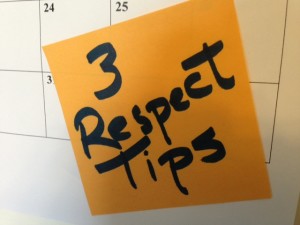 Respect is a topic that comes up in schools daily. The need for respect is always growing, and it helps to reduce the amount of bullying in schools as well as other benefits for the students, teachers, and parents. Here are three simple tips to increase the level of respect in your school:
Respect is a topic that comes up in schools daily. The need for respect is always growing, and it helps to reduce the amount of bullying in schools as well as other benefits for the students, teachers, and parents. Here are three simple tips to increase the level of respect in your school: In order to understand how racism, stereotyping, and bigotry are related to bullying, it is necessary to understand the following concepts.
In order to understand how racism, stereotyping, and bigotry are related to bullying, it is necessary to understand the following concepts.
